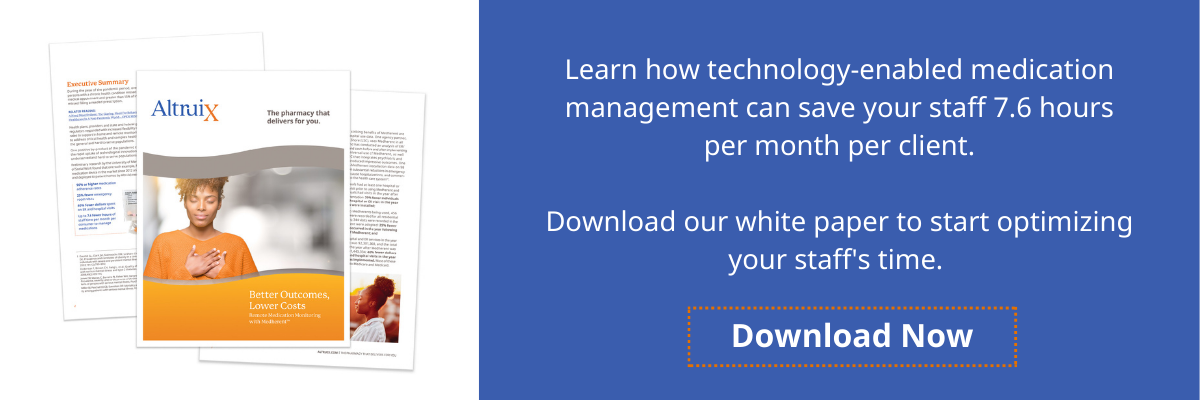Independent pharmacies can provide more personalized care to individuals with behavioral health conditions or intellectual and developmental disabilities.
Like much of healthcare, pharmacy has seen many changes in recent decades, including buyouts and mergers. As a result of the industry consolidation, only a small handful of pharmacy organizations take in the majority of drug revenue. These same large pharmacy corporations often own or are closely connected with the organizations responsible for setting the prices of drugs and making the most money – and in their mission to maximize profits, patients suffer the consequences.
Patients, especially those with disabilities or who require complex treatment for behavioral health conditions, are struggling to get access to and afford the drugs they need. These patients need a different way of doing pharmacy. They need local, independent pharmacies that offer customized solutions to their unique needs. They need pharmacists and pharmacy techs who can connect with patients as members of the community, offering consultation, financial aid, and personalized support to those who have been left behind – or dropped entirely – by large pharmacy organizations.
Returning a Sense of Community Responsibility
Why local and independent? With the consolidation, store closures, and reduced hours happening within large pharmacy organizations, accessing care becomes even more challenging for populations that already face difficulties. However, independent pharmacies have emerged as a stable alternative, adapting to cater to the specific needs of consumers, particularly those underserved populations.
Decades ago, the rise of big corporations threatened to marginalize independent pharmacies, endangering their existence in the market. Nevertheless, these independent pharmacies have transformed and adapted themselves to align with consumer demands. They now offer personalized care, extended operating hours, and convenient locations, all at a time when large corporations are restricting access through store closures and limited hours. Independent pharmacies stand as a reliable source of stability and support for the populations that need it the most.
Local pharmacies can also offer customized services, which set them apart from larger pharmacies and are often able to provide more personalized care and counseling to individuals than large pharmacies, which in turn gives those pharmacists a better understanding of the unique needs of each person.
Pharmacy staff from local, independent pharmacies can build relationships with the people they serve and have a chance to see them as real individuals who are members of their community. This allows them to offer tailored advice and recommendations, which can lead to improved health outcomes. The people they serve often feel more comfortable discussing their health concerns with their pharmacists, because of the relationship they have established.
While large pharmacy corporations often rely on digital chat or large phone staff so the same person can never be reached and no relationship is cultivated, these local pharmacists can build strong relationships with each individual. The strong community bonds can lead to better adherence to medication regimens and improved health outcomes from the patient.
Serving populations with complex conditions
Independent pharmacies can specialize in at-risk or complex patients, such as those with behavioral health issues and disability challenges. For these patients, expertise in their condition and the medication used to treat their condition is vital. Their local pharmacist can spend time understanding the medications they need and life-changing treatments that they may not have access to through large retail pharmacies.
Additionally, for individuals with behavioral health conditions or intellectual and developmental disabilities, medication adherence depends on the price and ability to get their medication in a manner that fits their needs and lifestyle. Independent pharmacies can serve these populations and tailor the services to address any barriers individuals have in accessing their medications.
Part of the community
Local, independent pharmacy operations have their finger on the pulse of the community in a way that major pharmacy corporations simply cannot compete with. A study by the Rural Health Information Hub found that independent pharmacies are more likely to be involved in their communities than large pharmacies. They may sponsor local events, donate to local charities, and volunteer time. Their staff ultimately contributes to the local economy. This community engagement can help to build goodwill and support for the pharmacy, helping customers feel more connected and comfortable with who they’re doing business with.
Additionally, a local pharmacy team may be better equipped to connect individuals to community resources. Because they are part of the local community, they likely know about local services available to individuals, and because they are not working for a large pharmacy corporation, they have the flexibility in their workflows and processes to help connect an individual to those services.
The freedom to innovate
Independent pharmacies can also adopt new technologies at a rapid pace – and in many cases first. According to a report by Accenture, 63% of consumers believe that independent pharmacies are more innovative than large pharmacies. This perception is fueled by the fact that local pharmacies are often more likely to adopt new technologies.
Large pharmacies face significant challenges in implementing new technologies due to their size and bureaucratic nature. Implementing new technologies across hundreds or thousands of pharmacies can be a daunting task, requiring a significant investment in time and resources. In contrast, local pharmacies have fewer stores and can implement new technologies more quickly and efficiently.
Access for underserved populations
Large pharmacies are often reluctant to serve underserved areas because they are not as profitable as other regions. As a result, independent pharmacies play a vital role in rural communities that larger organizations often cannot address. In many cases, local pharmacies provide the only access to prescription medications and other healthcare services for people who live in underserved areas like urban pharmacy deserts and rural areas.
Another study by the National Community Pharmacists Association found that independent pharmacies are more likely to be located in rural areas than large pharmacies. The study notes that independent pharmacies are more likely to offer a variety of services that are important to rural residents, such as medication counseling, vaccinations, and home delivery of medications.
Yet another study found that poor access to pharmacy in urban areas directly impacts health equity, with Black and Latinx neighborhoods becoming pharmacy deserts more often than other neighborhoods. Local, independent pharmacies with flexible delivery models can fill a gap for these populations.
People in underserved communities who struggle with addiction, mental health challenges, and disabilities often heavily rely on medication to manage their struggles. For some patient populations, their pharmacy is a lifeline that could mean the difference between stability and a very serious negative health outcome.
Stability in uncertain times
Since 2019, large national drug chains like Walgreens and CVS have both announced the closure of hundreds of stores. A severe shortage of pharmacy technicians has led many corporations to consolidate locations or reduce store hours. These changes represent yet another barrier for at-risk populations to get their medications, particularly those who cannot get to the store during regular business hours or have limited transportation options.
Through economic challenges and unexpected global events, independent pharmacies remain a pillar of stability. With the ability to be more flexible and attuned to local needs, many independent pharmacies have quickly evolved to serve the people who need them the most.
Thrive Locally
Independent pharmacies play a significant role in keeping their communities healthy by providing more personalized care and counseling to patients and offering the flexibility to meet the unique challenges of various patient populations they serve.















